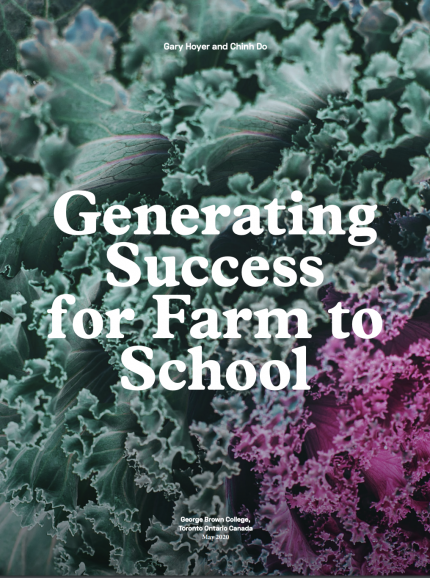Generating Success for Farm to School: a new report and workshop manual from George Brown College
Posted: August 13, 2020
Categories: Edible Education Network / Good Food Ideas for Kids / GoodFoodBites / News from Sustain Members / News from Sustain Ontario / Research / Schools
 Following a 3-year partnership with Sustain Ontario, Farm to Cafeteria Canada and Ecosource, George Brown College has released 2 new resources:
Following a 3-year partnership with Sustain Ontario, Farm to Cafeteria Canada and Ecosource, George Brown College has released 2 new resources:
- Generating Success for Farm to School, a research paper written by Gary Hoyer and Chinh Do, explores the many benefits of the farm to school approach and illustrates how schools are an optimal venue for supporting student health & wellness, the community, the environment, and the economy.
- Fresh & Local Farm to School: Snack Recipe Cookbook, Student Workshop & Lab Manuals, created by faculty and students for use at workshops delivered to middle and secondary schools.
As a part of this partnership and SSHRC-funded initiative, Sustain Ontario and George Brown College Centre for Hospitality and Culinary Arts hosted an interactive workshop in February 2019 entitled Farm to School in Ontario: Exploring Solutions to Common Challenges. This event brought together passionate Farm to School champions from across Ontario to discuss ways to enhance their Farm to School efforts. You can find the Workshop Summary here.
We are grateful for the opportunity to collaborate on the Generating Success for Farm to School Initiative. You’ll find more information about the research paper below.
Generating Success for Farm to School is divided into two parts:
Part one of the report shares results from a survey that examined best practices and conditions necessary to support farm to school, while part two summarizes a comprehensive review of existing research on the benefits of a healthy diet, nutritious meals, and food literacy education — citing many compelling studies.
While highlighting the significant health and educational benefits that come from improved student nutrition and local food education—and the associated benefits for our communities and economy—the paper advocates for the implementation of a national school food program in Canada with a farm to school approach, noting the advocacy efforts of the Coalition for Healthy School Food.
The paper urges that both a farm to school approach and a national school food program are necessary: “without nutritious food and a good food literacy education, including the hands-on learning of farm to school, children’s health and well-being and academic success will likely suffer,” noting that “A national cost-shared universal school meal program will provide access to healthy food for students and Farm to School activities will buttress and enhance those benefits as they connect the community.”
The report also asserts that our current system contributes to illness that all three levels of government spend billions of dollars on each year to treat and prevent, showing why this research is so important: we must continue to verify and demonstrate how school food programs achieve benefits that far outweigh the costs of implementing them.
The findings summary on page 6 states that “Schools are in a unique position to provide students with opportunities to achieve health and wellness and academic, career, and adult success,” and that “providing students with a healthy diet of locally produced food and food literacy education would help to form the cornerstones of a healthy community, environmentally, socially, and culturally. Improvements to student nutrition through a universal healthy school food program will likely translate into health and educational benefits that drive larger economic gains. Adding Farm to School initiatives will offer more benefits to students, the community, and the local economy.”
Access the full report online here.
